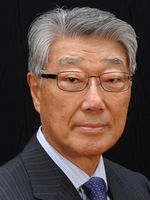1c49 The James and Agnes Kim Associate Professorship of Neurosurgery

Mr. Kim is founder and Executive Chairman of Amkor Technology, Inc., one of the world’s largest providers of outsourced semiconductor packaging and test services. Amkor pioneered the outsourcing of IC packaging and testing and is now a strategic manufacturing partner for the world’s leading semiconductor companies, foundries, and electronics OEMs.
In 1977, Jim and Agnes Kim co-founded Amkor's retail arm, Electronics Boutique, and later diversified it into a retailer of computer software, PCs, and video games. In 2005, the company was acquired by GameStop Corp. in a transaction valued at approximately $1.44 billion.
Mr. Kim is an Emeritus Trustee of the University of Pennsylvania. He served as a member of the Board of Trustees from 1998 until 2006.
In 2021, the Kim family, through the James and Agnes Kim Family Foundation, made a pledge of $25 million supporting a range of initiatives across Penn. Penn Medicine received $10 million of this donation, supporting the Kim Family Fund for Neurovascular Surgery Innovation, the Kim Family Neurovascular Surgery Program Term Endowed Fund, and the James & Agnes Kim Neurovascular Surgery Endowed Fund.
 Current Chairholder
Current Chairholder
Jan-Karl Burkhardt, MD
Jan-Karl Burkhardt, MD, holds numerous leadership and administrative roles at Penn Medicine, notably at the Neurovascular Tissue Bank and Translational Lab, Center of Excellence - Cavernous Malformation, Cerebral Revascularization Program, and the Neurointerventional Fellowship Program, and serves as the Division Head for Cerebrovascular Surgery. He earned his MD at the University of Leipzig, Germany, and his PhD at the University of Zurich, Switzerland.
Dr. Burkhardt employs both microsurgical and endovascular techniques to address neurovascular disorders and is working to develop maximally effective and minimally invasive treatment approaches. One area of his research focuses on cavernous malformations, which are clusters of dilated, thin-walled blood vessels in the brain that can cause stroke and seizures – and which currently require surgical treatment. Dr. Burkhardt is working with basic science researchers to develop a medication for patients with multiple cavernous malformations or those who have cavernous malformations in locations that are difficult to reach surgically, with the goal of providing easier solutions for patients and avoiding surgery altogether.
Dr. Burkhart is also exploring the power of robotics to advance precision medicine for neurovascular conditions. He and his colleagues are working to further develop remote applications for the Corindus Vascular Robotics platform for neuro-specific applications, such as carotid stenting and eventually stroke intervention. This will allow surgeons to perform complex endovascular procedures remotely, ensuring that even more patients can benefit from Penn’s investment in life-saving technologies—no matter where they are in the world.
In his efforts to train the next generation of neurovascular surgeons, Dr. Burkhardt has created a new curriculum for Penn’s neurosurgery residents as well as a Neurointerventional Endovascular Fellowship. This two-year interdisciplinary program includes faculty from neurosurgery, neuroradiology, and neurology and has drawn applications from talented candidates from around the world.

